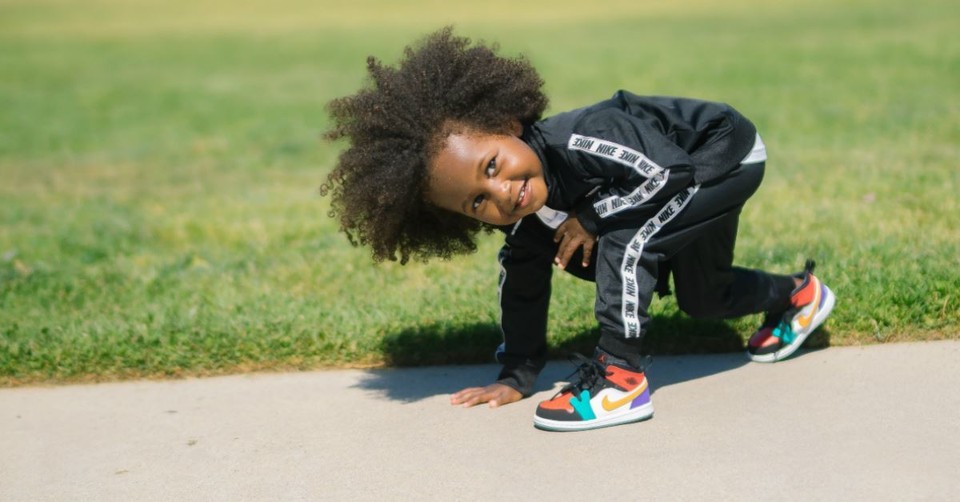7 Ways to Help Your Child Have a Positive Body Image

Yesterday a young dad told me about his bedtime ritual with his two daughters, ages four and six. After the girls kiss mommy goodnight, they climb into bed where daddy reads a story and tucks them in. They say bedtime prayers together, but before he turns off the light and shuts the door, the girls remind him, “It’s time for your kind words, Daddy”. He smiles. He knows it’s time, but he waits for them to ask anyway. Their father-daughter ritual has its own special rhythm.
“You girls are soooo beautiful!” He declares. And then he asks, “And why are you beautiful?”
“Because GOD says we’re beautiful!” they shout in unison, all giggles and smiles.
My friend had no idea I was about to write an article about how to help your children develop a positive body image. Without knowing it, though, he’s doing it. With every kind word, every bedtime story, every goodnight kiss, every reminder of his girls inherent beauty simple because God says so, this dad is instilling a healthy, positive self-image into his children.
And we can do the same. Here’s how:
1. Affirm Your Child
We live in a body-obsessed culture. In an effort to de-emphasize body obsession, many parents ignore the topic all together. Some reason, “since the culture over-emphasizes physical appearance, I’ll combat the over-emphasis with under-emphasis--I’ll say nothing at all.”
This is a mistake.
God made us body, soul, and spirit. Our inward character counts more than our external attractiveness; still, our body is an integral part of who we are. To deny this is to deny God’s creation and demean his creativity in making us. But to over-emphasize our body is to idolize it. When the pendulum swings too far either way, we communicate a skewed perspective about our bodies.
Since our culture sends messages about body images, parents should address the issue, too--but from a healthy, God-centered perspective.
A balanced approach comes when a parent validates their child’s innate attractiveness, which is hand stamped on each human by God. Every child--every person--is beautiful, because they are created in the image of God. A child who is made to feel attractive by his or her parent--with a warm smile, a tight hug, a verbal compliment--has a greater chance of accepting themselves, appreciating their Creator, and is less likely to seek inappropriate attention from other, less wholesome, sources as they enter their teen years.
2. Emphasize What Your Child’s Body Can Do More Than How it Looks
For you created my inmost being;
you knit me together in my mother’s womb.
I praise you because I am fearfully and wonderfully made;
your works are wonderful,
I know that full well!
King David modeled a healthy body image. He acknowledged that God created His body, and he was wonderfully made. He even declared, “I know that full well!”
We help our children develop this same perspective by teaching them God made their bodies and by pointing out all the wonderful things it can do. “Look how fast your strong legs help you run!” “You can pick up your sister? Wow, you have strong arms!” “Your cute little lips form into the most beautiful smile.”
But what if your child’s body isn’t like everyone else’s? What if your child is disabled, or different?
A friend with a disability once confided that the source of his confidence was the way his mother taught him to handle his difference. When he was old enough to understand she said, “Son, you have ________. That makes you different from most kids, but it doesn’t make you less special. You might hear hurtful remarks, but I’m here to help you learn how to handle them. I want you to know I love you, I believe in you, and you can do anything you work hard at doing. And I’m going to remind you how special you are every day.”
Even though my friend’s body is different, he lives filled with confidence, and believes he is fearfully and wonderfully made. All because his mother taught him so.
3. Realize Body Image is as Much Caught as it is Taught
King David spoke about his body in positive terms. Do you?
If you’re like most people, the answer is “no”. 80% of American women and 35% of men are dissatisfied with the way they look. Our children pick up on our body dissatisfaction (“Ugh! I’m so fat!” “There’s no way I’m getting into a bathing suit!” “Look at these wrinkles!”) and conclude looking a certain way equates with feeling happy or unhappy.
Over 80% of 10 year olds are afraid of being fat.53% of 13 year-old American girls are unhappy with their bodies, and the number grows to 78% by the time girls reach 17. Boys are not immune to body dissatisfaction, especially as they enter puberty. 30% of teen boys use unhealthy weight control behaviors such as skipping meals, fasting, smoking, vomiting, and taking laxatives.
To help combat body dissatisfaction, practice what you hope your child will embrace: speak positively about yourself. Focus on what your body can do more than how it looks. Remember the words of my friend: “You are beautiful because God says so! “ Model a positive body image to increase the odds your child won’t fall prey to the body dissatisfaction that ravages our culture.

Photo Credit: Unsplash/Robert-Collins
4. Limit Media Use
Most of our culture’s body obsession comes through media. It only makes sense, then, to limit our child’s media intake. Parents must know how much their child watches, and what they watch.
Studies show that viewing reality television increase body dissatisfaction. Social media, where nearly every photograph is filtered, and kids and teens often pose to look “sexy”, skews body perception, too. Parents who want their child to develop a healthy body image (and more important-- a healthy soul!) can’t be lax in monitoring media use.
5. Understand How Verbal Comments Affect Body Image
In preparation for writing this article I asked my husband and young adult kids if they could recall any negative comments made about their body during their childhood or teen years. The answer was a unanimous “yes!”
My family recounted everything from flippant remarks by a friend, like “I’ve never noticed how big your nose is before”, to embarrassing comments from classmates about being the first to wear a bra, to hurtful comments by a stranger, “Hurry up, fatso!” Interestingly, no one in my family has a large nose, entered puberty abnormally early, or is fat. And still, these comments stung. And stuck.
Parents cannot underestimate how vulnerable our children feel when negative comments are made about any part of their body. Even in jest.
Make it a practice to never say hurtful things about your child’s body. Nicknames like “string bean”, “shorty”, or any nickname that highlights how a child is different may be intended to be playful but, more often than not, will feel hurtful. For an older child and teen, different means weird, and weird means unaccepted. So guard your tongue.
6. Practice Healthy Habits
Our bodies are a gift. Like any gift we should take care of it. We should enjoy it.
We motivate our children to care for their gift by helping them eat healthy and stay active. When a child grows up riding her bike, playing sports, or going on family walks, exercise equals fun, not something people do because they don’t want to be “fat”.
Studies show people who eat healthy and stay active feel better, have more confidence, and feel better about life, in general. Don’t make healthy choices a big deal; instead, create a home where eating healthy and staying active is simply a way of life. Then, as your children grow, they will likely make healthy choices on their own.
7. Create An Climate Where Your Child Can Talk to You about Anything
Maybe the most important component in helping our children develop a positive body image is making sure our kids have a positive relationship with us! The world can be cruel, and our kids need to know they have a safe haven at home; a place where no topic is taboo, no struggle off-limits. Loving parents can pave the way for a child to overcome the harmful messages our culture sends, or hurtful comments others make.
Like my friend with the two young daughters who reminded their dad, “it’s time for your kind words, Daddy!”, when we spend positive time with our child, and speak kind words to our child, we lay the groundwork for a positive body image.
Donna Jones is a national speaker, author and pastor’s wife. She’s the author of Seek: A Woman’s Guide to Meeting, God, Taming Your Family Zoo and the Get Healthy Bible study series. Donna is mom to three funny, Jesus loving young adult kids who frequently sit on her kitchen counter, just to chat. Connect with Donna and find out about her free online Bible studies at www.donnajones.org or on Instagram @donnaajones.
Photo Credit: ©Unsplash/Taylor Smith
Originally published December 25, 2019.




